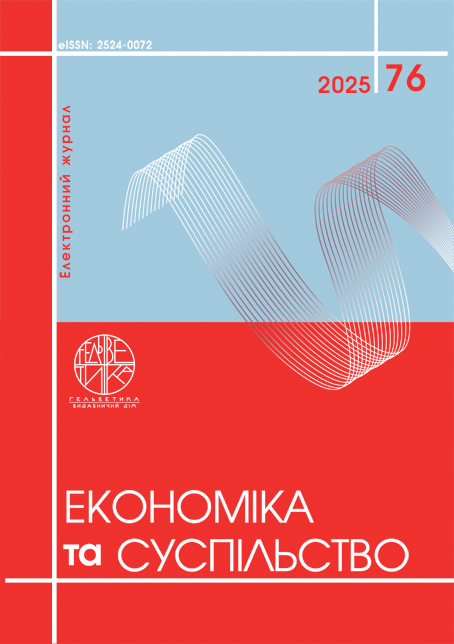TOURISM SCIENCE AS A TOOL FOR RESEARCHING THE ECONOMY OF VULNERABLE TERRITORIES
Abstract
Tourism science — as a science that operates with the categories of spatial development, mobility, demand, and sustainability — can provide a precise analytical framework for assessing the economic sustainability of vulnerable territories. The purpose of the article is to scientifically substantiate tourism science as an effective tool for researching and modeling the economic development of vulnerable territories in conditions of destabilization and structural restructuring of the economy. The object of the study is economic processes occurring in vulnerable territories, in particular post-conflict, environmentally risky or socially depressed regions. The article substantiates the relevance of using tourism science as a tool for researching the economy of vulnerable territories, in particular in the context of regions that are in a state of social, economic or environmental instability. It is determined that tourism science has a powerful potential, since it combines methods of economic analysis, social geography, spatial planning, environmental security and strategic management. It is proven that tourism can act not only as a source of income, but also as an analytical basis for modeling sustainable development, identifying local resources and forming new scenarios for the restoration of economic activity in areas with a high level of risk. The study established key parameters that characterize tourism studies as a tool for studying the economy of vulnerable areas: interdisciplinarity, spatial analysis, socio-economic sensitivity, resource capitalization, flexibility for restoration and integration of security approaches. The strategic effects of tourism studies are characterized, which consist in supporting long-term development models and preserving local identity, as well as tactical effects associated with the practical implementation of decisions regarding employment, local business, and resource optimization. The author's vision is proposed, which summarizes the features of the application of tourism studies for the analysis and stimulation of economic activity in such regions.
References
Басюк Д. І. Трансформація туризму в Україні на принципах сталого розвитку: досвід європейських країн. Економiка та держава. 2019. № 2. С. 17–21.
Соловйов Д. І. Вдосконалення понятійного апарату теоретичного забезпечення функціонування туристичної сфери. Вісник Бердянського університету менеджменту і бізнесу. 2011. № 4(16). С. 82–88.
Федорченко В. К. Туризмологія: концептуальні засади теорії туризму: монографія. Київ : Академія, 2013. 368 с.
Герасименко В. Г. Ринки туристичних послуг: стан і тенденції розвитку: монографія / за заг. ред. професора В.Г. Герасименко. Одеса : Астропринт, 2013. 334 с.
Збарський В. К., Грибова Д. В. Малі форми господарювання у розвитку внутрішнього туризму України. Вісн. Черкаського ун-ту: Серія «Економічні науки». 2020. Вип. 2. С. 160–169.
Бондаренко М. П. Теоретичні засади розвитку індустрії туризму. Економічний часопис ХХІ. 2012. № 3-4. С. 19–22.
Біль М. М. Механізм державного управління туристичною галуззю на реґіональному рівні: теоретико-прикладний аспект; за наук. ред. д.е.н. О. П. Крайник. Львів : ЛРІДУ НАДУ, 2011. 228 с.
Мелько Л. Ф. Туризм у контексті сталого розвитку. Вчені записки Університету «КРОК». 2017. Вип. 48. С. 190–197.
Голод А. П. Безпека регіональних туристичних систем: теорія, методологія та проблеми гарантування: монографія. Львів : ЛДУФК, 2017. 340 с.
Леськів Г., Левків Г. Менеджмент в умовах інновацій внаслідок застосування технологій на базі штучного інтелекту: виклики при переході до Індустрії 5.0. Наукові інновації та передові технології. 2024. No 7(35). С. 278–285.
Штангрет А., Силкін О., Шляхетко В. Трудова міграція як зовнішня загроза для кадрової безпеки підприємства. Наукові інновації та передові технології. 2024. № 10(38). С. 190–201. DOI: https://doi.org/10.52058/2786-5274-2024-10(38)-190-201
Штангрет А., Силкін О. Безпекові аспекти управління персоналом в умовах гіпердинамічного зовнішнього середовища. Наукові інновації та передові технології. 2024. № 9(37). С. 227–237. DOI: https://doi.org/10.52058/2786-5274-2024-9(37)-227-237
Basiuk, D. I. (2019). Transformatsiia turyzmu v Ukraini na pryntsypakh staloho rozvytku: dosvid yevropeiskykh krain [Transformation of tourism in Ukraine based on sustainable development principles: Experience of European countries]. Ekonomika ta derzhava, (2), 17–21. [in Ukrainian]
Soloviov, D. I. (2011). Vdoskonalennia poniatiinoho aparatu teoretychnoho zabezpechennia funktsionuvannia turyzmu [Improvement of the conceptual apparatus of theoretical support for the functioning of tourism]. Visnyk Berdianskoho universytetu menedzhmentu i biznesu, (4(16)), 82–88. [in Ukrainian]
Fedorchenko, V. K. (2013). Turysmoholiia: kontseptualni zasady teorii turyzmu: monohrafiia [Tourismology: Conceptual foundations of tourism theory: Monograph]. Kyiv: Akademiia. [in Ukrainian]
Herasymenko, V. H. (Ed.). (2013). Rynky turyzmu: stan i tendentsii rozvytku: monohrafiia [Tourism services markets: State and development trends: Monograph]. Odesa: Astroprint. [in Ukrainian]
Zbarskyi, V. K., & Hrybova, D. V. (2020). Mali formy hospodariuvannia u rozvytku vnutrishnoho turyzmu Ukrainy [Small-scale enterprises in the development of domestic tourism in Ukraine]. Visnyk Cherkaskoho universytetu: Seriia «Ekonomichni nauky», (2), 160–169. [in Ukrainian]
Bondarenko, M. P. (2012). Teretychni zasady rozvytku industrii turyzmu [Theoretical foundations of tourism industry development]. Ekonomichnyi chasopys XXI, (3–4), 19–22. [in Ukrainian]
Bil, M. M. (2011). Mekhanizm derzhavnoho upravlinnia turyzmu na rehionalnomu rivni: teoretyko-prykladnyi aspekt [The mechanism of state governance of the tourism sector at the regional level: Theoretical and applied aspect] (O. P. Krainyk, Ed.). Lviv: LRIDU NADU. [in Ukrainian]
Melko, L. F. (2017). Turyzm u konteksti staloho rozvytku [Tourism in the context of sustainable development]. Vcheni zapysky Universytetu “KROK” – Scientific Notes of KROK University, (48), 190–197. [in Ukrainian]
Holod, A. P. (2017). Bezpeka rehionalnykh tury stychnykh system: teoriia, metodolohiia ta problemy harantuvannia: monohrafiia [Security of regional tourism systems: theory, methodology and guarantee issues: Monograph]. Lviv: LDUFK. [in Ukrainian]
Leskiv, H., & Levkiv, H. (2024). Menedzhment v umovakh innovatsii vnaslidok zastosuvannia tekhnolohii na bazi shtuchnoho intelektu: vyklyky pry perekhodi do Industrii 5.0 [Management in the context of innovations based on artificial intelligence technologies: Challenges in the transition to Industry 5.0]. Naukovi innovatsii ta peredovi tekhnolohii, (7(35)), 278–285. [in Ukrainian]
Shtangret, A., Sylkin, O., & Shliakhetko, V. (2024). Trudova mihratsiia yak zovnishnia zahroza dlia kadrovoi bezpeky pidpryiemstva [Labour migration as an external threat to the personnel security of the enterprise]. Naukovi innovatsii ta peredovi tekhnolohii, (10(38)), 190–201. DOI: https://doi.org/10.52058/2786-5274-2024-10(38)-190-201 [in Ukrainian]
Shtangret, A., & Sylkin, O. (2024). Bezpekovі aspekty upravlinnia personalom v umovakh hiperdynamichnoho zovnishnoho seredovyshcha [Security aspects of personnel management in a hyperdynamic external environment]. Naukovi innovatsii ta peredovi tekhnolohii, (9(37)), 227–237. DOI: https://doi.org/10.52058/2786-5274-2024-9(37)-227-237 [in Ukrainian]
Copyright (c) 2025 Мар'яна Багрій

This work is licensed under a Creative Commons Attribution 4.0 International License.


